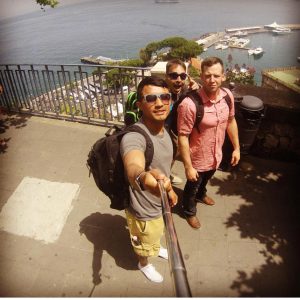Former Army paratrooper lands at Kronos, celebrates community thanks to Microsoft Software & Systems Academy
To Ashish Singh, your network matters. More specifically, your support network.
For the paratrooper medic turned software engineer, that network has always helped him navigate life’s twists and turns. It’s what brought him from Nepal to America when he was 17 years old. It’s what led him to enlist in the U.S. Army. And it’s why he chose to work at Kronos Incorporated—a global leader in workforce management and human capital management software—after graduating from Microsoft Software & Systems Academy (MSSA). The rewards have been consistent, and hard-won.
A solid educational foundation eluded Ashish in childhood. “We could barely afford my school,” he says, “and because of political unrest, the school was shut down often.” His mother dreamed of sending Ashish, her only child, to study in America. Eventually, in January 2008, her dream was realized when Ashish and two of his friends were accepted at Ferris State University in Michigan. They arrived with almost nothing—save one another. Even now, Ashish mostly remembers feeling overwhelmed.
“My English was horrible. People would ask me to repeat myself about a thousand times a day,” he says.
Determined to make the most of his opportunity no matter the obstacles, Ashish began to study manufacturing engineering. But after a couple years—during which he pivoted his studies toward computer science and earned a scholarship to study computer engineering—Ashish couldn’t shake the feeling that there was more he wanted to do.
“I’d always wanted to do something great,” he says, “but throughout that time, I felt like I was studying for my family rather than for myself.”
Then, with just one semester remaining in his degree program, Ashish stumbled upon what seemed to him a chance at that greatness: The U.S. Military Accessions Vital to the National Interest (MAVNI) program.
Originally established to enlist foreign nationals in the U.S. military to bolster its foreign language capabilities and improve cultural diversity, the MAVNI program was temporary, Ashish knew; it had been suspended once before. So he chose not to risk waiting until after graduation to enlist. He even hoped to pursue computer engineering after enlisting.
But when a physical exam revealed that Ashish was colorblind and therefore disqualified from pursuing IT in the Army, he was unsure of what to do. He chatted with his bunkmates and discovered they were hoping to become paratroopers. Before long, Ashish was training with them to come to the rescue of their fellow soldiers around the world.

Stationed in Italy, Ashish traveled and trained with allies throughout Europe. Alongside the intensity, Ashish found solidarity and a sense of pride. With support from family, friends, and fellow soldiers, he was doing his “something great.”
Then, after a bad jump on a training route over Germany resulted in a back injury, it came time for Ashish to consider his own health. He and his wife—whom he’d met and married in Latvia—relocated to Fort Bragg in North Carolina. But, despite limiting his physical activity, Ashish’s pain worsened. His wife encouraged him to consider other options, and so his thoughts returned to software engineering.
Through his network of friends and former classmates, Ashish learned about MSSA, a Microsoft Military Affairs program launched in 2013 to help U.S. service members and veterans transition from the military into technology careers. He applied and was accepted into the second MSSA cohort at Fort Bragg, which taught Cloud Application Development.
Now available at 14 military locations nationwide, MSSA can graduate up to 1,000 participants each year. Graduates are guaranteed interviews with Microsoft and/or some of the program’s 280 hiring partners. On average, graduates land IT jobs with annual salaries starting at $70,000.
Amid the demanding coursework, Ashish once again found value in the camaraderie of his cohort. “Even more than the course, we learned from each other,” he says. “We helped each other out, we created and implemented projects together, we attended meetups together.”
They even prepared for interviews together. Ashish applied and interviewed at several of the program’s hiring partners, but Kronos stood out from the start for its culture, which has earned it accolades around the world, including Fortune magazine’s “100 Best Companies to Work For,” Glassdoor’s “Best Places to Work,” and Forbes’ “America’s Best Employers.” When it came to deciding which job offer to accept, the community appeal won out.
“We recently asked our interns to count how many potlucks, cakes, dinners, and other activities we’ve had,” Ashish says. “They lost count.”
But even better, he says, is the support to grow professionally. As an MSSA hiring partner, Kronos is committed to helping participants like Ashish effectively transition into a rewarding career—offering support and guidance they might not receive elsewhere. The result is a close partnership that is helping to address the need for more skilled workers in technology while also equipping transitioning service people to thrive in a digital world.

“Veterans across all branches of the military have honed exceptional skills and abilities that are in high demand for technology companies—including paying careful attention to detail, executing in a high-stress environment, and collaborating to fulfill a mission,” said Kristen Brown, vice president of global talent acquisition at Kronos. “Yet translating what they’ve learned and what they’ve done into corporate speak doesn’t always come naturally in the transition to civilian life. Programs that help veterans develop business-world confidence and open the doors to corporate opportunities are invaluable.”
In his role as a front-end developer, Ashish is generally focused on application modules that impact user experience. But he’s taking advantage of the opportunity to grow in multiple ways. For example, given his background and broad interest in coding, his mentor also gives him opportunities to work on back-end scripting. And to cap it off, he finished his last semester of school, earning his computer science degree online in May 2018.
“With everything going on, I thought I would never graduate,” he says. “But nobody in my family has a degree, so I wanted to be the first one and make my mom proud.” He’s looking forward to walking in the graduation ceremony in December 2018.
“I’m going to walk, just for her,” he says.
Because in the end, it’s always been a team effort.
